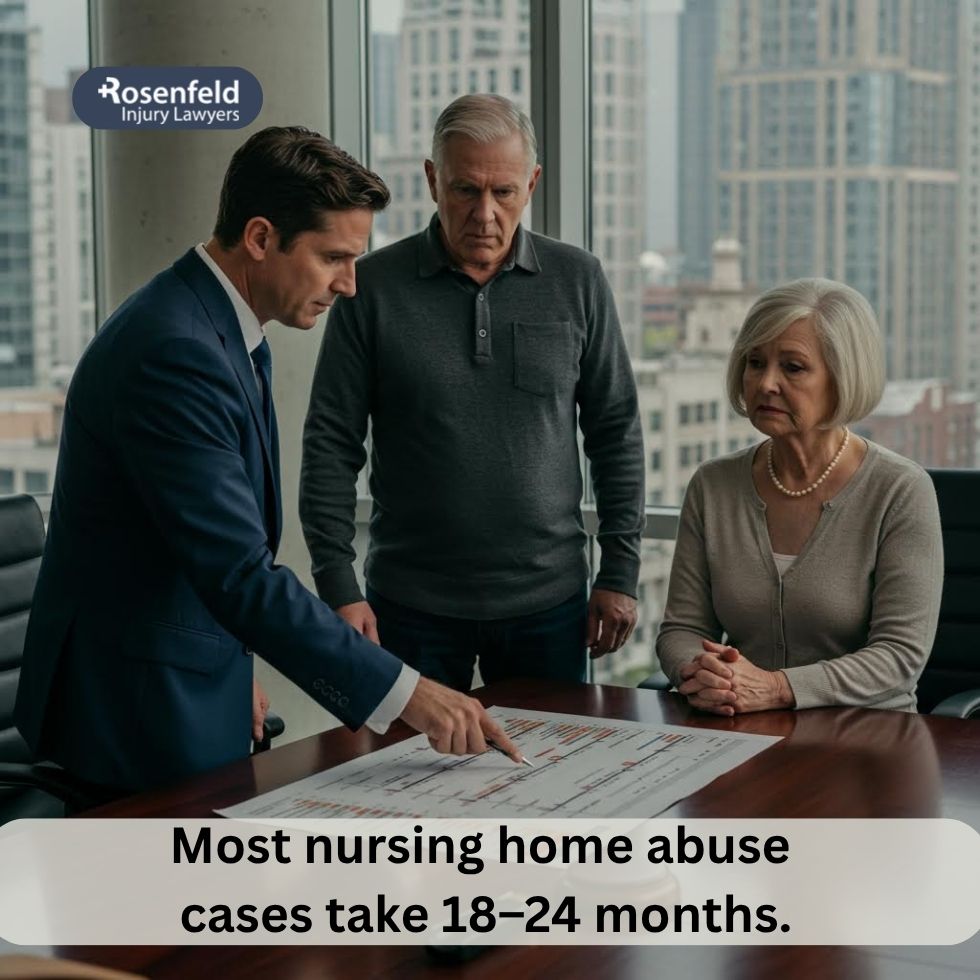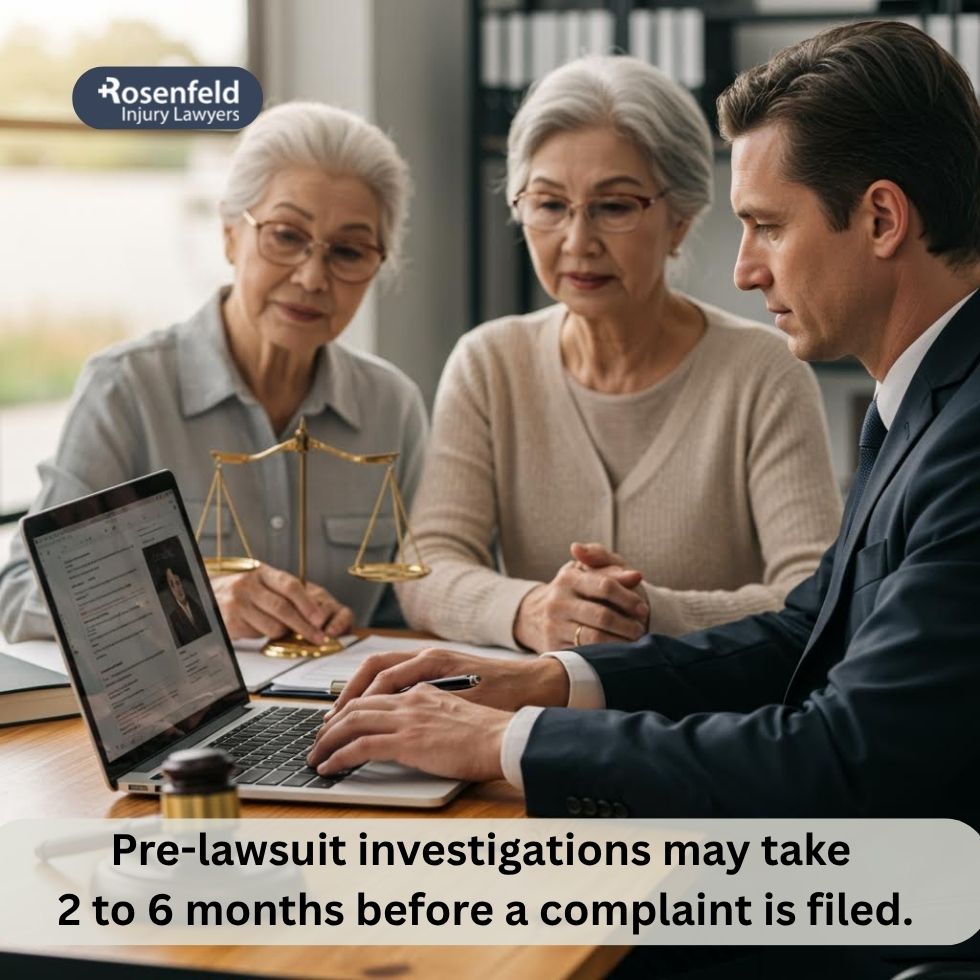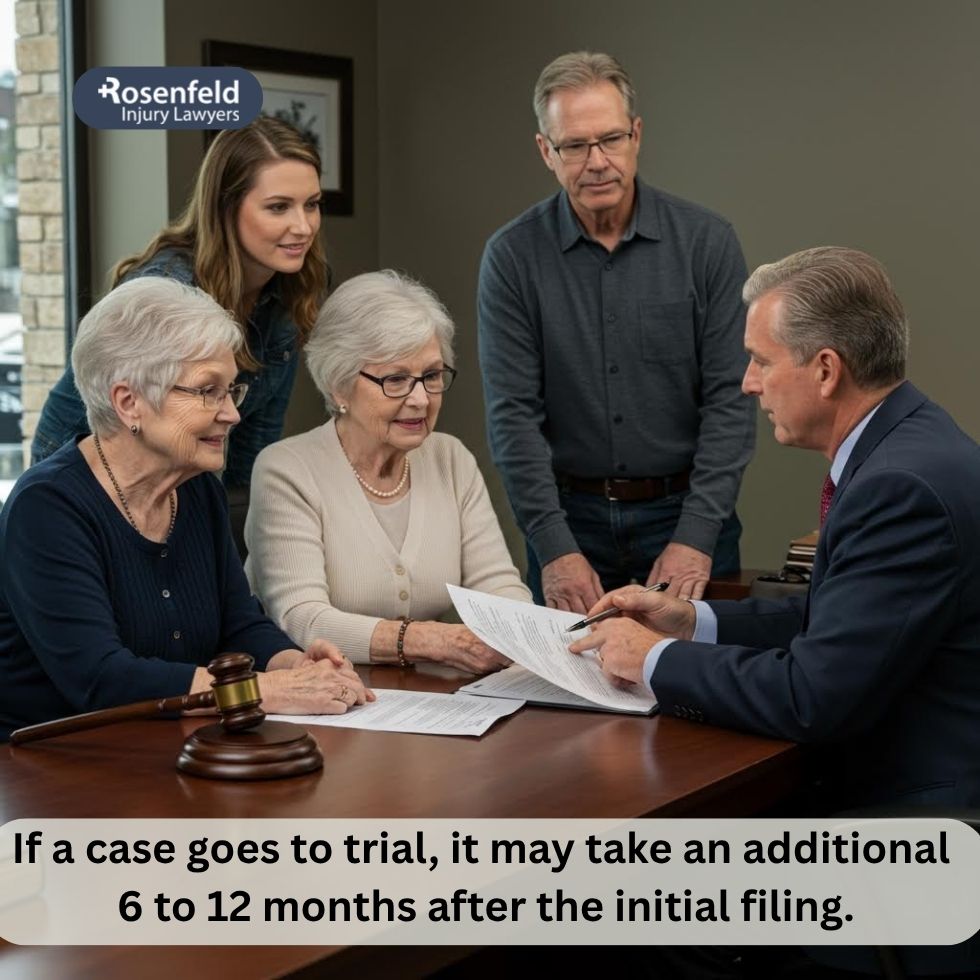- 24/7 Free Consultation: (888) 424-5757 Tap Here To Call Us
How Long Does a Nursing Home Lawsuit Take?

One of the most common questions families ask when pursuing legal action after a loved one has experienced abuse or neglect is, “How long does a nursing home lawsuit take?” The answer varies.
While some neglect cases resolve in months, others can last years. This article breaks down the nursing home lawsuit process and the key factors that influence timelines in Chicago nursing home lawsuits.
When nursing home residents suffer abuse or neglect, families may pursue compensation with a nursing home lawsuit. A successful claim can help cover medical bills, legal fees, and other costs tied to the harm caused.
An experienced nursing home abuse lawyer in Chicago can guide you through your legal options and help you receive financial compensation for the physical and emotional toll.
Legal Recourse for Victims of Nursing Home Neglect and Abuse
When a nursing home fails to provide adequate care, resulting in harm to a resident, legal action can be taken to seek justice and compensation. Filing a nursing home abuse lawsuit can address issues such as:
- Physical Abuse, including unexplained bruises, fractures, or injuries.
- Neglect, such as malnutrition, dehydration, or poor hygiene.
- Medical malpractice includes errors in medication administration or failure to provide necessary medical care.
- Financial exploitation, like unauthorized use of a resident’s funds or property.
An experienced lawyer will help families through the process of filing nursing home lawsuits, ensuring all legal options are explored to hold the facility accountable.
This includes determining liability, negotiating with the nursing home’s legal team, and, if necessary, pursuing the case in court.

Timeline Variations in Elder Abuse Cases
Many attorneys estimate that a typical home lawsuit may last between 18 and 24 months. However, this average does not apply to every situation. Each case is different. The duration of a nursing home lawsuit depends on the complexity of the claims, the behavior of the defendant facility, and whether the case settles or proceeds to trial.
Key Factors Affecting Your Home Lawsuit Timeline
Several factors can impact how quickly or slowly a nursing home abuse lawsuit progresses:
Case Complexity
If the case involves severe injuries, disputed healthcare records, multiple parties, or substantial damage, it will take longer. Claims that include punitive damages or involve a resident’s death may require additional time to gather critical evidence and assess the lasting impact on the family.
Willingness to Negotiate
Some nursing homes and their insurance companies are more cooperative than others. When the other side refuses to participate in reasonable settlement negotiations, litigation often takes longer.
Settlement vs. Trial
The majority of nursing home lawsuits settle before trial. However, if a case proceeds to court, the time required for trial preparation, pre-trial motions, and court scheduling can significantly delay the final resolution.
Additional Delays
The court system’s backlog, extensive discovery requests, and disputes over liability or damages can all add time to a nursing home abuse lawsuit. If Adult Protective Services opens an investigation, for example, it can delay the start of legal proceedings.
Attorneys may wait for APS findings before filing, especially if those findings help strengthen the case or confirm neglect.

The Typical Stages After You File a Nursing Home Lawsuit
Understanding the general structure of the legal process can help set expectations for how long things may take.
Stage 1: Initial Consultation & Investigation Phase
The process begins when you contact a nursing home abuse lawyer. During the first consultation, you’ll explain what happened, review any documents you have, and decide if legal representation makes sense.
An experienced personal injury lawyer will assist in gathering evidence, which may include:
- Medical Records: Detailed documentation of the resident’s health status, treatments received, and any noted injuries or conditions.
- Photographic Evidence: Images of injuries, unsanitary conditions, or other signs of neglect.
- Witness Testimony: Statements from staff, other residents, or visitors who can attest to the conditions or incidents in question.
- Facility Records: Staffing logs, incident reports, and maintenance records that may reveal patterns of neglect or abuse.
Stage 2: Filing the Lawsuit and Serving the Nursing Home
Once your legal team has enough evidence, they will file a nursing home lawsuit in court. After filing, the nursing home is formally served and given a deadline to respond. In Illinois, defendants typically have 30 days to file a response.
Stage 3: The Crucial Discovery Process
The discovery process is the most time-consuming part of most nursing home lawsuits. This stage involves both sides exchanging information and building their cases. This can involve:
Written Discovery (Interrogatories & Document Requests):
Each side submits questions that must be answered under oath. Attorneys will also request critical documents such as staffing records, policies, and internal emails that may reveal nursing home negligence.
Depositions (Oral Testimony):
Lawyers take sworn statements from the people involved, including staff, former employees, expert witnesses, and family members. This stage of a nursing home lawsuit is essential for gathering evidence and building a strong case.
Stage 4: Settlement Negotiations & Mediation Efforts
Settlement discussions may begin during or after the discovery stage. Attorneys for both sides may negotiate terms back and forth. If progress stalls, they might attend formal mediation with a neutral third party. Many nursing home abuse lawsuits are resolved through these settlement negotiations.
Stage 5: Trial Preparation and Court Proceedings
If no settlement agreement is reached, the case moves to trial. Your nursing home abuse attorney will prepare by finalizing evidence, exhibits, and witness lists. Trial preparation includes pre-trial motions and conferences with the judge. A full trial may last anywhere from several days to several weeks.
Stage 6: Verdict, Judgment, and Potential Appeals
Following a trial verdict, the court enters a judgment. In some cases, the losing party may file an appeal, which can significantly extend the timeline of the lawsuit.

How Long Does Each Stage Typically Take?
Each nursing home case is different, but most follow a similar timeline, especially when the goal is to settle a nursing home dispute outside of court. Timelines can vary depending on whether the claim involves a long-term care center or a nursing home and how quickly both parties cooperate during the process.
Cases involving serious harm or death often take longer to resolve due to the complexity of the issues and the amount of documentation required.
Here’s a closer look at the typical timeframe for each legal phrase:
Initial consultation and investigation (2–8 weeks)
This stage involves meeting with a personal injury attorney to review medical records, witness accounts, and incident reports. If the attorney agrees to take the case, they’ll begin collecting preliminary evidence to build the foundation for a formal legal claim.
Filing and service (1–2 months)
Once enough evidence is gathered, your attorney files the complaint with the court. The defendant (often a nursing home or assisted living facility) is then formally served and must respond within a court-mandated window, typically around 30 days.
Discovery process (6–18 months)
This is the most time-consuming stage in most nursing home lawsuits. Both sides exchange information, including witness testimony, internal documents, and medical evaluations. Discovery helps establish patterns of neglect or personal injury, especially in claims involving pressure ulcers, malnutrition, or wrongful death.
Settlement discussions (ongoing)
Some cases settle early, especially if the evidence is strong and the facility’s legal team wants to avoid trial. Others settle later after discovery uncovers proof of abuse or systemic failures. Your attorney may also issue a demand letter to push for compensation during this phase.
Trial preparation and court proceedings (2–4 months or longer)
If the case doesn’t settle, both sides prepare for trial. This includes pre-trial motions, expert reports, and courtroom strategy. Cases involving large corporations or multiple parties may take longer to prepare, especially when expert witnesses are involved.
Appeals process (6–12+ months if applicable)
If a trial results in a verdict and one party files an appeal, the process can last significantly longer. Appeals in elder abuse matters are often centered on liability disputes, evidentiary challenges, or contested damages awards.
Every stage plays a critical role in holding negligent facilities accountable. While it may be a lengthy process, working with a seasoned personal injury law firm increases your chances of a successful outcome and fair compensation.
Keep in mind, under 735 ILCS 5/13-202, in Illinois, you generally have two years to file a nursing home lawsuit. This period starts from the date of injury, death, or the date the harm was discovered. Failing to file a nursing home lawsuit within this statute of limitations could mean losing your legal rights entirely.
Why Most Neglect Cases Settle Before Trial
In most nursing home abuse situations, settling outside of court is preferred. Families often want a resolution without enduring years of litigation, depositions, and courtroom appearances. A settlement allows them to obtain monetary compensation and closure more quickly, avoiding the emotional strain and unpredictability of a trial.
From the facility’s perspective, settling a nursing home lawsuit protects its reputation and helps avoid the scrutiny of a public trial. A jury verdict might not only result in higher damages but could also expose widespread nursing home negligence or patterns of neglect.
By settling, a nursing home can keep damaging details out of the public record and avoid costly legal expenses.
These practical benefits make it common for both sides to negotiate terms during discovery or mediation. Even in serious nursing home abuse lawsuits, a fair settlement may be the most efficient way to resolve the dispute, especially when the evidence is strong and liability is clear.
How Long After Settlement Do You Receive Payment?
Once a nursing home abuse lawsuit is resolved and a settlement agreement is finalized, most nursing home residents or their families receive compensation within four to six weeks. However, delays can occur if there are unresolved liens related to Medicare, Medicaid, or private insurers. Before funds are released, these third-party payers must often be reimbursed from the settlement.
A knowledgeable nursing home abuse lawyer works to expedite this process by coordinating with all parties involved and handling the necessary documentation. Their goal is to minimize delays so you can access the funds you’re entitled to, especially when the nursing home lawsuit follows long-term abuse, personal injury, or wrongful death.
Securing financial compensation isn’t the end of the legal process when you sue a nursing home. However, with the right representation, it’s often the beginning of recovery for families seeking justice after devastating nursing home abuse.
To learn more, schedule a free consultation with a trusted nursing home abuse lawyer who understands how to hold a nursing home accountable.
Can a Nursing Home Abuse Attorney Expedite the Process?
Hiring a skilled nursing home abuse attorney can make a major difference in how quickly your nursing home abuse lawsuit progresses. While no lawyer can guarantee fast results, a proactive legal team helps prevent unnecessary delays during key stages, including discovery, depositions, and negotiation.
A knowledgeable attorney understands how to gather critical evidence efficiently, respond to defense tactics, and pressure the nursing home’s legal team to stay on schedule. Their role also involves working directly with the insurance company to push for a fair settlement or prepare for trial if needed.
By choosing a personal injury lawyer with specific experience in nursing home abuse and nursing home neglect, you increase your chances of a smoother process. The sooner you seek help, the sooner your legal team can begin building a strong case on your behalf.

FAQs About Chicago Nursing Home Lawsuit Timelines
Is There an Average Settlement Time Specifically for Nursing Home Abuse or Neglect Claims?
Although no two claims are identical, many nursing home abuse lawsuits are resolved between 18 and 24 months. A lawsuit involving clear documentation and a cooperative facility may conclude faster, while more complex cases take longer. Delays are more likely when filing nursing home lawsuits involving multiple facilities or unclear records.
Do Wrongful Death Cases Typically Take Longer Than Injury Cases?
Yes. When a resident passes away due to abuse or mistreatment in a nursing home, the case often involves more extensive documentation and greater financial stakes. This added complexity can lengthen the timeline, particularly if multiple agencies or insurers are involved.
How Does the Nursing Home’s Willingness to Cooperate Affect the Timeline?
The timeline of a nursing home lawsuit can be significantly affected by how responsive the facility is. Some cooperate quickly with requests and provide information efficiently. Others delay or complicate the process. A skilled nursing home abuse lawyer knows how to apply pressure and keep things moving.
What Are Common Reasons the Discovery Process Gets Delayed?
The discovery stage of a nursing home abuse case often slows down when records are incomplete, staff are unavailable, or disputes arise about what must be shared. An experienced attorney can help navigate these slowdowns and streamline the process to avoid unnecessary delays while pursuing the strongest possible outcome.
Book a Free Consultation with a Personal Injury Lawyer

If someone you love has suffered abuse or neglect in a nursing home, don’t wait to take action. Our law firm represents clients in elder abuse and nursing home abuse lawsuits throughout the Chicago area. Our personal injury lawyers work with families to investigate claims, pursue legal action, and help them seek justice when nursing home care standards are violated.
Schedule a free consultation with a trusted nursing home abuse lawyer. During this free initial consultation meeting, we’ll discuss your rights, the stages of a potential lawsuit, and your options for seeking financial compensation. We also offer a free legal consultation for those unsure whether their situation qualifies for a personal injury case.
Contact us at (888) 424-5757 or through our online form to discuss your options with a personal injury attorney in Chicago.
All content undergoes thorough legal review by experienced attorneys, including Jonathan Rosenfeld. With 25 years of experience in personal injury law and over 100 years of combined legal expertise within our team, we ensure that every article is legally accurate, compliant, and reflects current legal standards.







